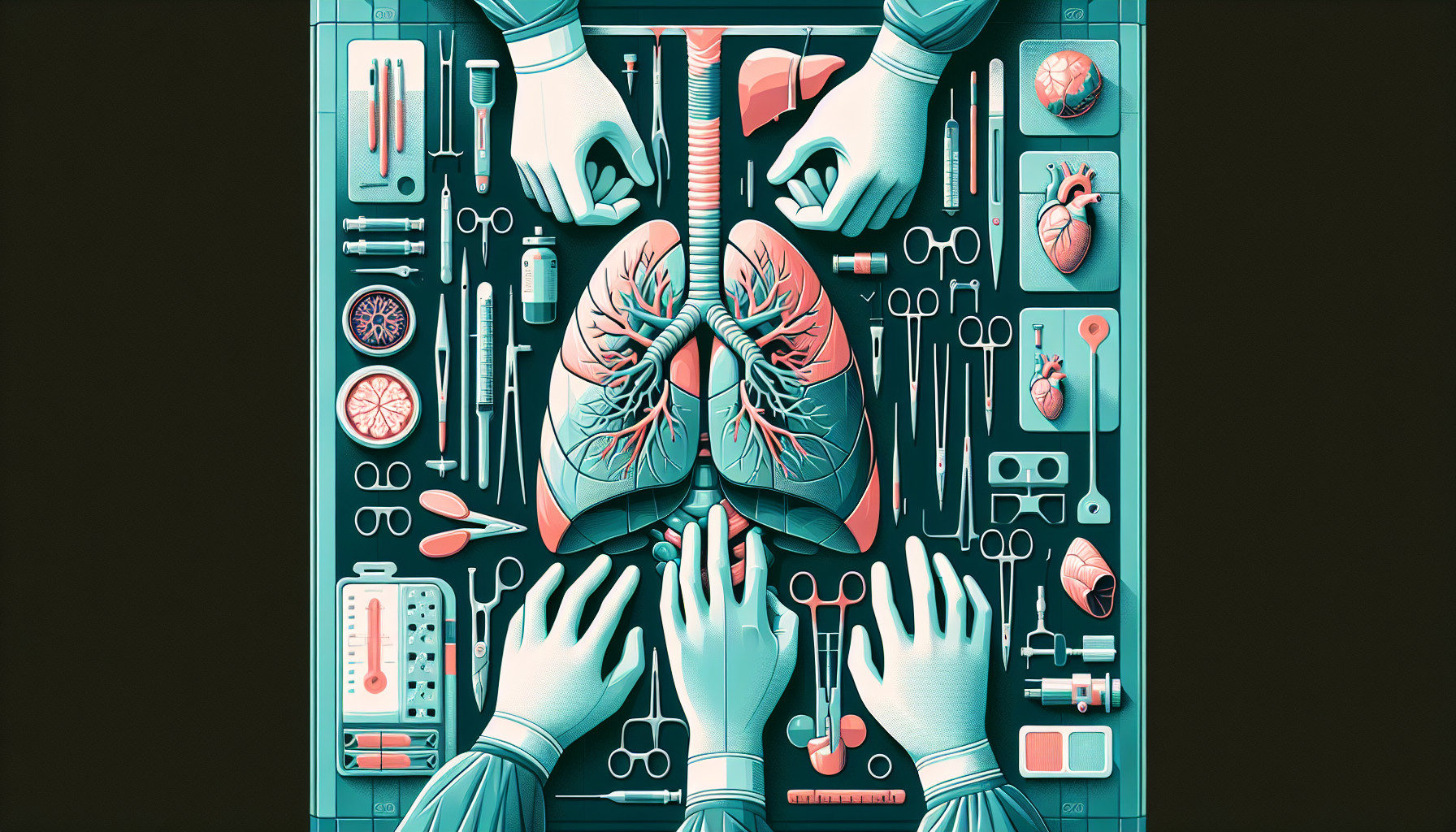Our Summary
This research paper looks at the complications of lung surgery in patients who are on hemodialysis. Hemodialysis is a treatment for kidney failure, where a machine filters waste and excess water from your blood, acting as an artificial kidney.
From 2007 to 2019, the researchers studied 43 patients out of 4989 who had lung surgery and were also on hemodialysis. Most of these were men, with an average age of 69, and a lot of them had lung cancer. The main reasons they were on hemodialysis were due to diabetes-related kidney disease and hardening of the kidney arteries.
The kind of lung operation varied, but most had a lobectomy, where a section of the lung is removed. They found that 37% of these patients had calcification (hardening due to calcium build-up) in their bronchial tubes (the tubes that carry air to your lungs).
After the surgery, about half of the patients had complications, with a third of them having serious complications needing further treatment. The researchers found that patients who had smoked heavily (10 or more pack years) and those whose operations took 140 minutes or longer were more likely to have serious complications.
The study concludes that for patients on hemodialysis, those who have smoked heavily and have longer surgeries may face more serious complications after lung surgery. Also, because these patients have a higher chance of bronchial calcification, surgeons should consider reinforcing the bronchial stump during the lobectomy operation.
FAQs
- What was the main focus of the research paper?
- What were the common factors among patients who experienced serious complications after lung surgery?
- What is the significance of bronchial calcification in patients on hemodialysis undergoing lung surgery?
Doctor’s Tip
Helpful tip: If you are on hemodialysis and undergoing lung resection surgery, it is important to discuss your smoking history with your doctor. Quitting smoking before surgery can help reduce the risk of serious complications. Additionally, be aware that longer surgeries may also increase your risk, so discuss any concerns with your healthcare team.
Suitable For
Overall, patients who are typically recommended for lung resection include those with lung cancer, tumors, or other lung diseases that cannot be treated with other methods. Additionally, patients who are on hemodialysis may also be recommended for lung resection, but they may face higher risks of complications, especially if they have a history of heavy smoking and longer surgeries. Surgeons should take these factors into consideration when deciding on the best course of treatment for these patients.
Timeline
In summary, before lung resection, a patient may undergo various tests and evaluations to determine the need for surgery and the extent of the procedure. After the surgery, the patient may experience complications such as infection, bleeding, or difficulty breathing. Recovery typically involves a hospital stay, pain management, and rehabilitation to regain lung function and overall health. Follow-up care is important to monitor for any potential complications and ensure a successful recovery.
What to Ask Your Doctor
Some questions a patient should ask their doctor about lung resection include:
- What type of lung operation is recommended for my condition?
- What are the potential risks and complications of lung surgery for someone on hemodialysis?
- How can my hemodialysis treatment plan be adjusted before and after the surgery?
- Are there any specific precautions or preparations I should take as a hemodialysis patient undergoing lung surgery?
- How will my recovery process differ from someone who is not on hemodialysis?
- How long will the recovery process take, and what can I expect in terms of pain management and rehabilitation?
- What follow-up care and monitoring will be needed after the surgery?
- Are there any lifestyle changes or precautions I should take to reduce the risk of complications after the surgery?
- Are there any specific signs or symptoms I should watch out for that may indicate a potential complication after the surgery?
- Will I need any additional support or resources during my recovery period as a hemodialysis patient undergoing lung surgery?
Reference
Authors: Watanabe Y, Hattori A, Fukui M, Matsunaga T, Takamochi K, Oh S, Suzuki K. Journal: Gen Thorac Cardiovasc Surg. 2021 Mar;69(3):478-486. doi: 10.1007/s11748-020-01489-x. Epub 2020 Sep 28. PMID: 32989668
